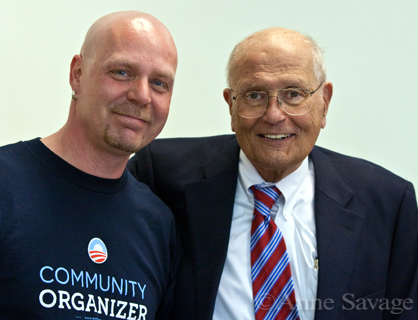For-profit government? I don’t think so.

Earlier this week, Newark, New Jersey mayor Cory Booker responded to an Obama campaign ad pointing out that Mitt Romney is running on his experience as a business person and explaining what that, in fact, means. He called the ad “nauseating” and “a distraction”. President Obama responded eloquently:
Transcript:
President Obama: Well, first of all I think Cory Booker is an outstanding mayor. He’s doing great work in Newark and obviously helping to turn that city around. And I think it’s important to recognize that this issue is not a, quote, distraction. This is part of the debate that we’re going to be having in this election campaign about how do we create an economy where everybody from top to bottom, folks on Wall Street and folks on Main Street, have a shot at success, and if they’re working hard and they’re acting responsibly, that they’re able to live out the American dream.Now, I think my view of private equity is that it is — it is set up to maximize profits and that’s a healthy part of the free market. That’s – that’s part of the role of a lot of business people. That’s not unique to private equity, and as I think my representatives have said repeatedly, and I will say today, I think there are folks who do good work in that area, and there are times where they identify the capacity for the economy to create new jobs or new industries. But understand that their priority is to maximize profits. And that’s not always going to be good for communities or businesses or workers.
And the reason this is relevant to the campaign is because my opponent, Governor Romney, his main calling card for why he thinks he should be president is his business experience. He’s not going out there touting his experience in Massachusetts. He’s saying, ‘I’m a business guy and I know how to fix it,’ and this is his business.
And when you’re president, as opposed to the head of a private equity firm, then your job is not simply to maximize profits. Your job is to figure out how everybody in the country has a fair shot. Your job is to think about those workers who get laid off and how are we paying them for their retraining? Your job is to think about how those communities can start creating new clusters so that they can attract new businesses. Your job as president is to think about how do we set up a equitable tax system so that everybody’s paying their fair share that allows us then to invest in science and technology and infrastructure, all of which are going to help us grow.
And so, if your main argument for how to grow the economy is, ‘I knew how to make a lot of money for investors,’ then you’re missing what this job is about. It doesn’t – it doesn’t mean you weren’t good at private equity, but that’s not what my job is as president.
My job is to take into account everybody, not just some. My job is to make sure that the country is growing not just now, but ten years from now and twenty years from now. And so, to repeat, this is not a distraction. This is what this campaign’s going to be about, is: what is a strategy for us to move this country forward, in a way where everybody can succeed? And that means I’ve got to think about those workers in that video just as much as I’m thinking about folks who have been much more successful.
Reporter: [inaudible]
President Obama: What I would say is, is that Mr. Romney is responsible for the proposals he’s putting forward for how he says he’s going to fix the economy, and if the main basis for him suggesting he can do a better job, is his track record as the head of a private equity firm, then both the upsides and the downsides are worth examining.
This highlights a fundamental difference between in the philosophy of President Obama and Mitt Romney as well as their vastly different understanding of what government is for. Last year, I attended a presentation by Mitchell Bean, the former director of the nonpartisan Michigan House Fiscal Agency. Here is what I wrote about it at the time:
As pointed out by Mitchell Bean, director of the Michigan House Fiscal Agency at a recent presentation I attended, the revenues:resource expenditure ratio for businesses is upside-down compared with governments. With a business, as the economy falters, demand for their products or services goes down. Therefore, you have less need for specific resources like raw materials, shipping, human capital, etc. With governments, the situation is exactly the opposite. When the economy is bad, the demand for government services INCREASES. The citizens have a greater need for the things governments exist, in part, to provide.So, modeling governments after corporations puts them on a path to be unable to serve the citizenry in their time of greatest need. It also begins to assign financial worth to our needs, putting a price tag on unemployment, health care and other essential services we use. Once that is done, a corporate cost-benefit analysis is sure to follow close behind. Those costs that don’t return enough benefit will be eliminated. That’s how you run a business.
This fundamental understanding of the role of government is one that Mitt Romney is either ignorant of or one he simply chooses to ignore.
 On a call this morning with Congressman John Dingell (pictured right with some blogger guy whose name rhymes with “Elect a dog”) and former Michigan State Representative Mike Huckleberry, Congressman Dingell was clear: this discussion isn’t a distraction and nobody is arguing that Mitt Romney and people like him shouldn’t be able to run their businesses in the way they see fit within the laws of our country. However, because Romney is running on his business background (and not, as both the Congresman and President Obama astutely noted, on his record as an actual governor), it’s completely fair and correct to delve into what that means in terms of his philosophy and vision for our country’s future.
On a call this morning with Congressman John Dingell (pictured right with some blogger guy whose name rhymes with “Elect a dog”) and former Michigan State Representative Mike Huckleberry, Congressman Dingell was clear: this discussion isn’t a distraction and nobody is arguing that Mitt Romney and people like him shouldn’t be able to run their businesses in the way they see fit within the laws of our country. However, because Romney is running on his business background (and not, as both the Congresman and President Obama astutely noted, on his record as an actual governor), it’s completely fair and correct to delve into what that means in terms of his philosophy and vision for our country’s future.
His history is not one of growing companies…it’s one of what many call “Vulture Capitalism” as opposed to “Venture Capitalism”…[Their] goal was to create wealth for investors…They took on debt and then paid themselves handsomely in the process…
No one is questioning his right to run his business as he sees fit. But we do have the right to question whether or not his experience qualifies him to run the country.
Congressman Dingell described Bain Capital’s handling of its acquisition of Ampad in the 90s. They purchased the company for $40 million, $35 million of which was borrowed. By 1999, Ampad went bankrupt with the loss of 1,200 jobs. Mitt Romney and his colleagues, of course, made a profit.
Mr. Huckleberry talked about a situation closer to home in Ionia, Michigan. Bain Capital purchased the auto parts supplier Cambridge Industries in 1995. It later closed its doors with a loss of 250 jobs. Mr. Huckleberry described the impact that such a catastrophe has on small towns like Ionia and nearby Greenville.
They say that for every job created in the auto industry, it creates five jobs in the private sector. The same thing goes for a lost job. The ripple effect in our communities is devastating.
He also talked about the Bain Capital acquisition of FTD Florist that was, at the time, based in Southfield, Michigan. When Bain Capital moved the company out of state, 600 jobs were lost.
When asked if the federal government would choose the same path with GM (of which it currently has part ownership) in terms of laying people off if it was necessary to return the American taxpayers money, Michigan Obama campaign press secretary Matt McGrath framed it this way:
Mitt Romney went into these situations to make money. President Obama did it to save jobs.
It’s interesting to watch Mitt Romney twist and squirm when his business record is revealed. HE was the one who chose to make this the focal point of his campaign rather than his history as a true public servant and HE was the one who asked us to look at his record.
Congressman Dingell put it perfectly in the call today:
As we go about the business of choosing a president, these are the things we must keep in mind.
And, indeed, we will.
By the way, Cory Booker has since backpedaled mightily from his comments.
[John Dingell/Chris Savage photo credit: Anne C. Savage, used with permission.]



